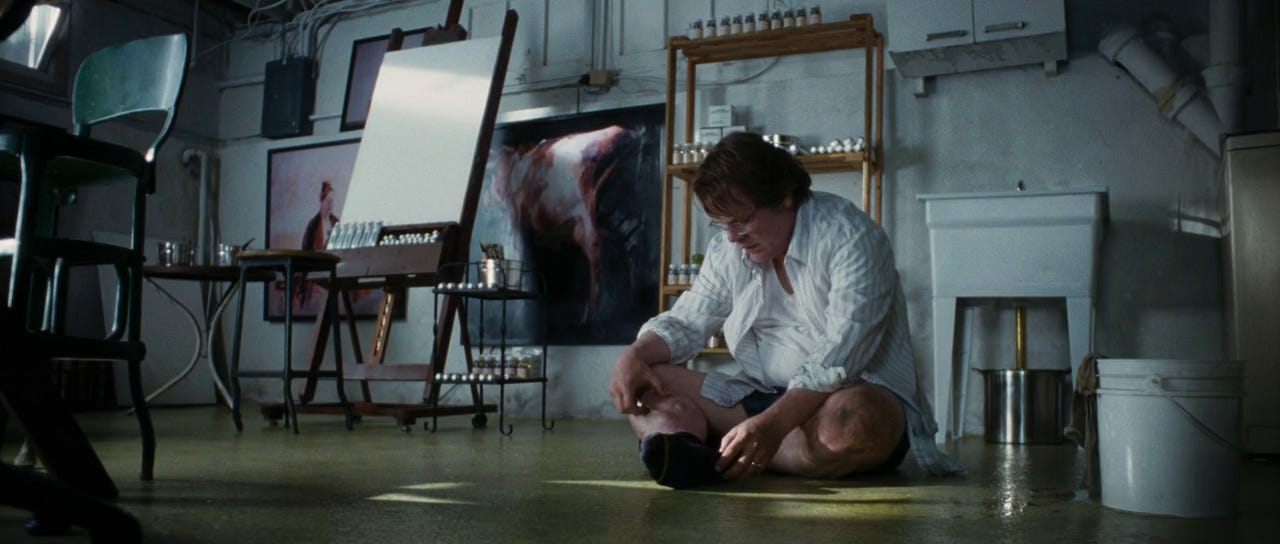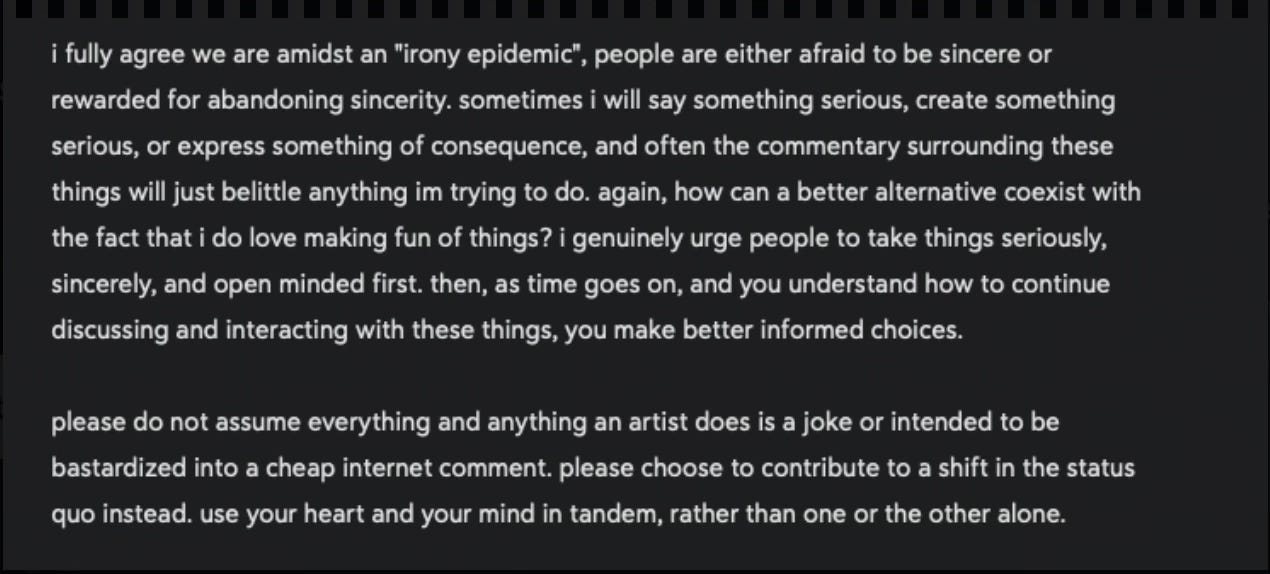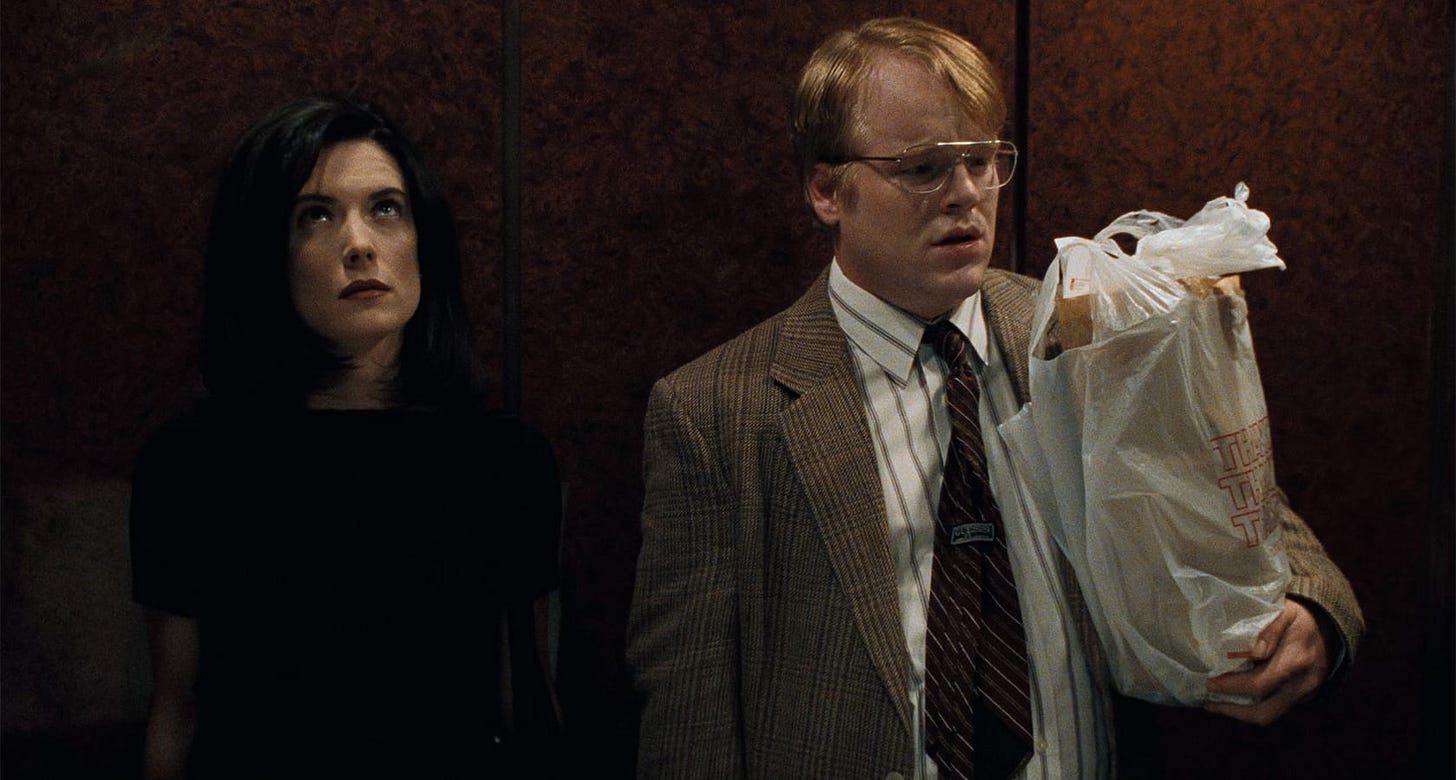the virtue of being disgustingly sincere
discussing the irony epidemic, as it applies to filmmaking and art
It seems like people have never been more terrified of, and desperate for, sincere connection.
I’m no exception. Something as minuscule as forgettable stone-faced small talk feels significant to me. I’ll think it over as I lay in bed. What’s small to some takes all of my strength. I have to strain to unscrew my nuts and bolts for a quick hello. I’m the very bravest when I’m halfway out the door. Saying goodbye to my coworkers, paying my bill at the bar. Thats when I can turn to a relative stranger and say something bold or clever or fun without every part of me shaking and crumbling. They’re never going to see me again, who cares? If they don’t respond how I like, I can leave quickly and they’ll forget in a day or two. Desperate for connection, yet avoidant of the risk it poses.
It’s not new that people may be afraid to dance alone, or speak first, or stand out, in fear they will look foolish. It’s in our nature to compare ourselves to others, to be self-doubting. It’s even worse when, at your fingertips, are thousands of more talented, attractive people to compare yourself to. It’s even worse when it seems like everyone is afraid to show that they care, to be vulnerable and sincere, so you ought not make a fool of yourself by doing so.
It’s achingly refreshing to hear “I like talking to you, we should hang out some time” from a person you have just begun to get to know. It can make your entire day to strike up a conversation with a stranger. These things that humans were built for - that fuel us - have become more rare, because it is safer to put up a wall, and for many superficial and anxiety-free online interaction is an easy replacement.
Before, you had to talk; making friends was entertainment. The reality that everyone is desperate for friendship, love, to be seen and understood, was right there on the surface. Putting yourself on the line for rejection can be easily prevented by putting up a wall of irony (humorous coldness and invulnerability) and looking at your phone when the conversation goes stale. It’s no secret that phones are adult pacifiers of sorts; padding what would otherwise be forced awkward conversion, preventing us from the pain of attempting meaningful connection or creation.
How does this apply to art? Ethel Cain’s post on the matter sparked some conversation on a topic I’ve dwelled on for a while now. I can’t tell you how many theaters and galleries I’ve left with a sour taste in my mouth at the artist or filmmaker’s embarrassment with the concept of their own creation. The proclivity to shoehorn humor where it need not be to prevent any scorn for their sincere creation.
A lack of sincerity means people are afraid to talk with passion and care about serious issues; *everything* is turned into a joke. Any meaningful or philosophical discussion surrounding art, media or culture is either treated as pretentiousness or quickly (uncomfortably) shifted into the humorous or topical. Our journalism is rife with it; desperate to appeal to a youth who refuse to a care as a shield. You can’t expose your lack of education or knowledge if you avoid intellectual conversation; you can’t embarrass yourself with expressions of your own passion if you hide your emotions.
This leads to films made entirely with the intention of being “cult classics”; entirely misunderstanding the concept of the term and creating something at best purposefully camp, and at worst needlessly quippy or ironic as armor for a middling plot. The best “so bad it’s good” cult classics are labelled as such because, in an earnest attempt to create good, meaningful, quality art, they failed and created something either deeply strange and uncanny or downright awful in hilarious ways. Truly beloved and artful cult classics can be humorous but also must retain some level of earnestness; they have to have truly attempted to create something great, that worked for a passionate few but ostracized general audiences. “Cult classics” can’t authentically exist if artists aren’t creating in earnest.
If everything you create is veiled with a layer of irony, if your attempt to create something sappy, or terrifying, is padded with quippy or campy humor artificially, you don’t have to face the fear that comes with baring your soul completely.
I know I’m going to be a bit contentious with my example here - but I think Vincent Gallo, piece of shit as he is, is a great example of earnestly self-indulgent (bordering on narcissistic) filmmaking that truly works in his favor.
His films are made almost entirely by his hand, with himself as the lead actor. His filmography is slow, quiet, uniquely stylized and deeply personal. They are everything that is typically lambasted as self-indulgent in filmmaking; stories written by and starring the writer and director, in which said creator plays a character who is posited as sexually desirable, complex and empathetic.
In my humble opinion, a film is only uselessly narcissistic when (a) the lead character, who we can assume is to some degree a self-insert or vessel for personal fantasy, lacks any meaningful flaw, and (b) characters surrounding him/her are treated with less depth, or purely as plot devices.
Gallo is relentlessly self-indulgent. In his infamous Buffalo 66, he goes to a public bathroom within the first five minutes of the film and a man standing at the urinal beside him comments on the size of his flaccid penis (no joke). It’s a bit laughable.
That being said, Gallo’s portrayal of lead Billy Brown doesn’t feel like it is meant to be boastful on behalf of Gallo. Brown is a traumatized ex-convict, a neglected little boy in the body of a lonely older man. When he kidnaps Layla, a young dancer, she seems to have nothing better to do than to go along with his plans. Like him, she is terribly lonely. She sees in him a gentle, troubled little boy who simply needs love to open him up and change his vengeful heart. Gallo is, of course, writing himself into a role in which a flawless and dreamlike Christina Ricci falls head over heels for him. But through his raw, earnest, emotional filmmaking he creates two terribly strange and real characters who we can see ourselves in. Layla’s quiet strangeness; her capacity to find love in this intensely broken and guarded man. She represents a very real, if troubling, aspect of the feminine experience. Billy’s behavior as a result of his unfortunate circumstances - the walls he puts up against any connection with others, is empathetic and relatable to viewers who have suffered abuse. The film portrays the nature of people in a way that most filmmakers don’t really care to venture into. It isn’t a shiny, idealistic view of love; it’s a filmmaker baring his own soul, his own desires, his own vulnerability on camera, and therefore showing something more innately human, whether you love it or hate it.
You’re valid to hate him - but you can’t say you’ve ever seen a romance film like Buffalo 66 or The Brown Bunny, and you certainly can’t say his portrayal of human behavior isn’t somewhat realistic and raw. When you pour yourself into your art, you create something more authentic, and the viewer will find themselves in it; no matter how specific your experience may feel.
Aristotle said, “One may observe in one’s travels to distant countries the feelings of recognition and affiliation that link every human being to every other human being.”
In media, in our social interactions and our interactions with the world at large, we look for ourselves. We look to understand ourselves, see ourselves in others, and understand others more deeply through this. It may sound self-possessed, but maybe humanity is a bit self-possessed. Our empathy and understanding of others comes from imagining ourselves in their shoes, relating to their experiences.
It’s ironic that we would rag on self-indulgent art as a whole when it is an artists’ desperate need to self-analyze within his own work that gave us the filmography of Charlie Kaufman.

Kaufman’s identity, fears, and creative process is central to his films across the board. His film Adaptation was meant to adapt Susan Orleans novel The Orchid Thief; but ended up being a self-analytical film about his process attempting to adapt the novel as a procrastinating, self-doubting screenwriter. In Synecdoche, New York, as well as his novel Antkind, his fears and experiences reverberate throughout.
His films are darkly comedic, absurdist, and at times surreal - tackling such major issues as visually conceptualizing the finicky nuances of an inner monologue on screen - but they try, desperately, to portray the inner workings of the human experience as he knows it. How can any writer do this honestly and earnestly without referencing, most of all, their own psyche and experiences? He inserts himself into typically self-doubting, deeply flawed, borderline pathetic characters surrounded by other characters with these same qualities. People who behave like people; morally gray, self-sabotaging, desiring love and connection above all else. This is why we will see ourselves more in the diary of a stranger than the average plot-centered action or horror film. Don’t get me wrong, my goal here isn’t to denigrate those films - a couple of my favorite films of all time are Mad Max and Obayashi’s House - I simply think there’s nothing wrong with pouring your heartfelt, overshare-y, pathetically desire-filled diary into your filmmaking, or your writing, or your art.
The first person to cut the small talk and open up and share something deeply personal is the one that eases the tone of the room, that helps real connection or friendship to form. Art can serve this purpose; helping us to see parts of ourselves we may not fully understand or have the words to speak about yet.
When I first watched Kaufman’s adult stop motion animated film Anomalisa, I was overwhelmed by the depiction of the love interest Lisa. It was the first time I had ever seen a woman on screen express, in a non-fetishistic and embarrassingly honest way, feeling unlovable. She is taken back to the hotel room of a famous author after going for drinks with him and a close girlfriend. Immediately upon entering the room, she asks why he didn’t ask her friend instead - everyone prefers her friend. He expresses being enamored with her voice, and she puts a wall up; afraid he’s a “chubby chaser”, admitting that she hasn’t been with anyone in years. Her inability to believe that she would be anyone’s object of desire is deeply touching. You feel like you’re looking into someone’s diary; you’re a fly on the wall. To watch a love story where people behave as people, rather than behaving as we wish we were confident and brave enough to, is refreshing.
We yearn for art that expresses our most uncomfortable, honest, sincere realities. Genuine love, awkward conversations, human fear and lack of confidence. It is far scarier to create by separating yourself from the subject matter, whether it’s by giving the characters and dialogue an unrealistic yet admirable sheen or adding a layer of irony to protect yourself from criticism. Everybody wants a cult film, nobody wants to be mocked for even a moment.
Before you add irony or pull away from inserting your personal thoughts and self indulgent ideas into your art in fear, remember that some of the greatest filmmakers have middling scores across their filmography. David Lynch and Charlie Kaufman have extremely mixed reviews from critics and audiences alike. If they didn’t pour themselves without fear and with complete sincerity into everything they created, nobody would laud their work and find such intense personal meaning it.
You are a little speck in the grand scheme of things, and you are everyone you’ve ever met. Nobody gives a fuck if you embarrass yourself. They might find some joy in discussing it as a means of desperately trying to connect with their fellow man, and for that your embarrassment is arguably a good thing. But truly - your experiences and thoughts and reflections on yourself are not yours alone. The more you bare them, the more you open yourself up to scorn, the more you allow others to open themselves up too. People are left more afraid and unfeeling than ever in a world that is terrified of sincerity. Whether in personal life or the art world at large, the sappy and unapologetically self-indulgent and open is of real value, now more than ever.
:3
byeee






